Key takeaways:
- Scholarship recipients often experience a mix of joy and self-doubt, resulting in mental health challenges due to pressure to perform academically.
- While scholarships provide financial security and a sense of belonging, they can also lead to burnout and fear of losing support, emphasizing the need for self-care.
- Building a supportive community among peers through shared experiences and coping strategies can significantly alleviate feelings of isolation and stress.
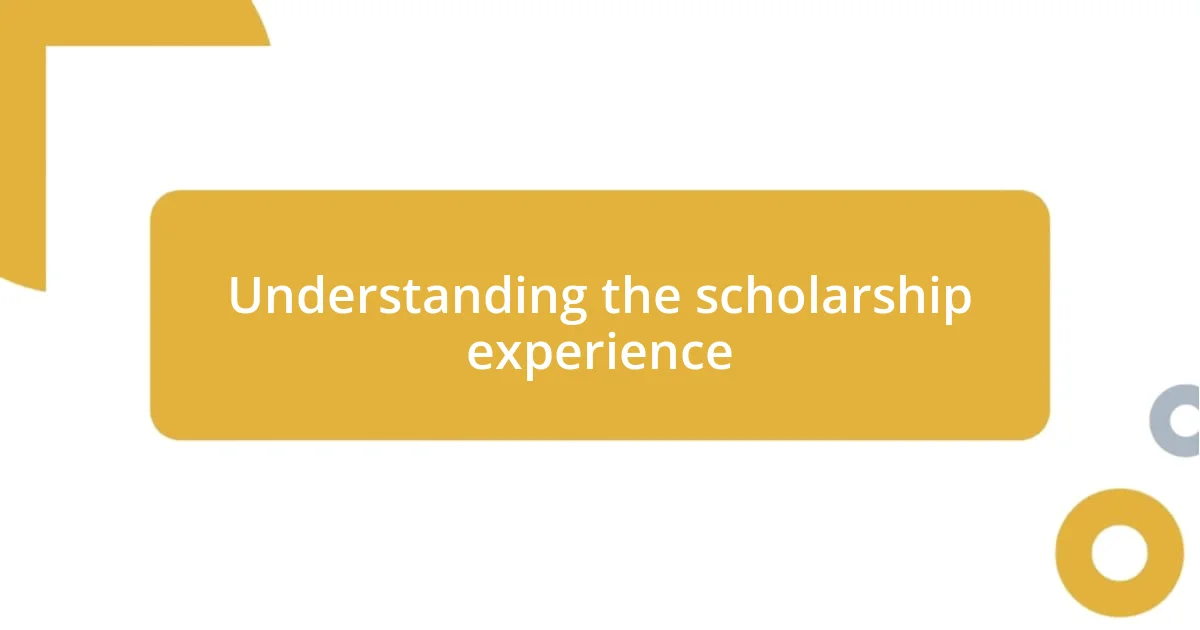
Understanding the scholarship experience
Navigating the scholarship experience can often feel like walking a tightrope. I remember receiving my first scholarship notification; there was a surge of joy, but alongside it came the nagging fear of whether I was truly deserving of such an honor. Have you ever felt that mix of exhilaration and self-doubt? It’s common to question your worthiness, especially when surrounded by talented peers.
The pressure to maintain a certain academic standard can be intense. I recall days spent in the library, cramming for exams, all while knowing that my scholarship was contingent on my performance. This relentless pursuit of excellence can weigh heavily on mental health. How do you balance the joy of achievement with the anxiety that follows? It’s a delicate dance that many scholarship recipients navigate.
More than just financial support, scholarships can impact your sense of identity. When I received my scholarship, it felt like the world saw my potential. But, with that recognition came expectations, which at times felt suffocating. How do we reconcile external validation with our internal struggles? These questions linger, shaping our experience well beyond the financial aspect of the scholarship.
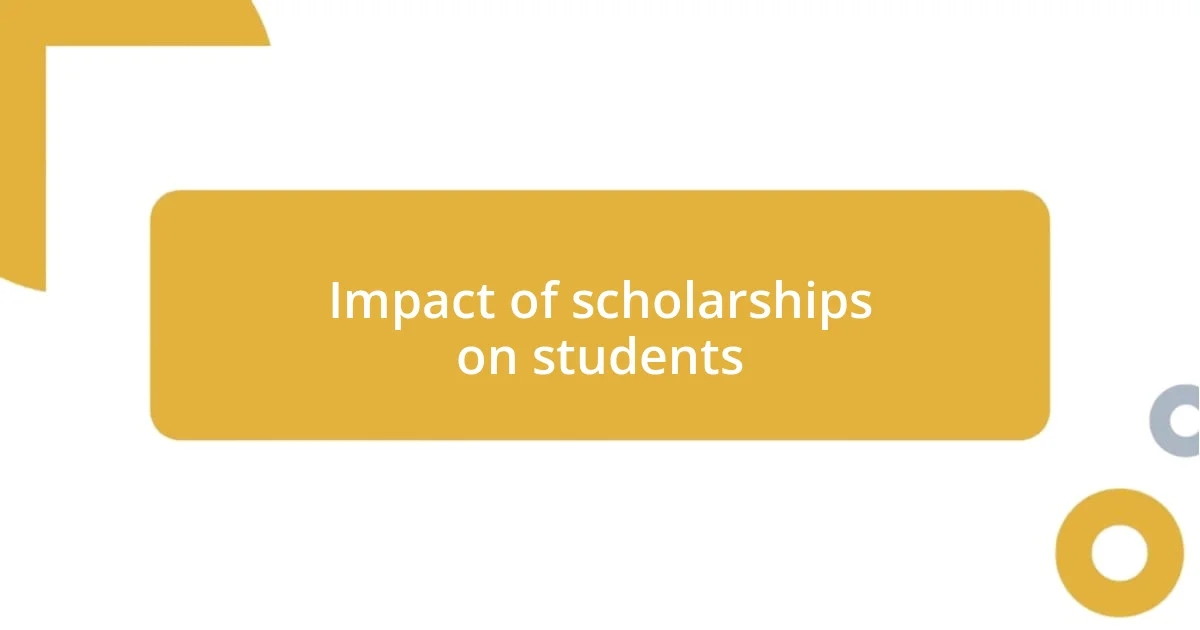
Impact of scholarships on students
The presence of scholarships profoundly influences students’ lives, particularly when it comes to their sense of belonging. I remember walking onto campus for the first time, a scholarship recipient among countless others. There was an unmistakable weight of responsibility but also a feeling of community. Suddenly, I was part of a network that recognized not just my potential but also the struggles of others like me. This shared experience can foster connections that challenge the isolation many students feel.
Financial security is another major benefit that scholarships provide. I had friends who juggled jobs while studying, and I could see the toll it took on their mental health. Because my scholarship alleviated my financial burden, I had the time to immerse myself in studies and truly engage in campus life. It’s fascinating how robust mental well-being can stem from simply having one less worry. Have you considered how financial stress plays into overall academic performance? It can be a significant hurdle.
Yet, it’s essential to recognize that scholarships can also create a pressure cooker environment. I’ve seen peers become so overly focused on living up to expectations that they neglect their own well-being. The deep-rooted fear of losing financial support can lead to burnout and anxiety. Balancing ambition with self-care often feels like an uphill battle. How do we support each other in prioritizing mental health while striving for excellence?
| Positive Impacts | Challenges |
|---|---|
| Sense of belonging | Pressure to perform |
| Financial security | Fear of losing support |
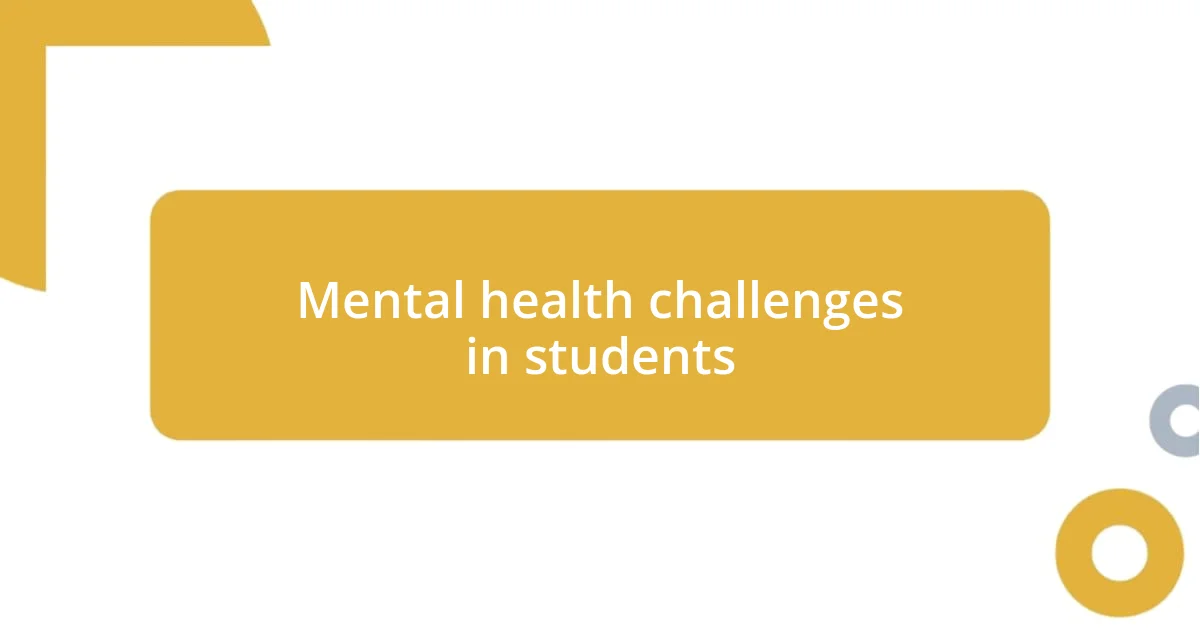
Mental health challenges in students
Mental health challenges are a reality for many students, often intensified by the pressures of academic life. I’ll never forget the late nights spent staring at my textbooks, feeling the weight of a million expectations. There’s an unspoken belief that if you’re smart enough to receive a scholarship, you should be able to handle everything effortlessly. But the truth is, we’re all human, wrestling with our doubts and fears.
- Increased anxiety around academic performance.
- Feelings of isolation despite being surrounded by peers.
- Imposter syndrome—questioning your abilities and worth.
- Burnout from juggling academic and personal demands.
- Overshadowed personal lives due to relentless study schedules.
The pressure to succeed can be overwhelming. I’ve seen friends spiral into struggles with mental health because they felt they couldn’t show weakness. In my own experience, there were times I wanted to reach out for help but felt paralyzed by the worry of what my peers or mentors might think. This façade of perfection can create barriers to seeking the support we really need.
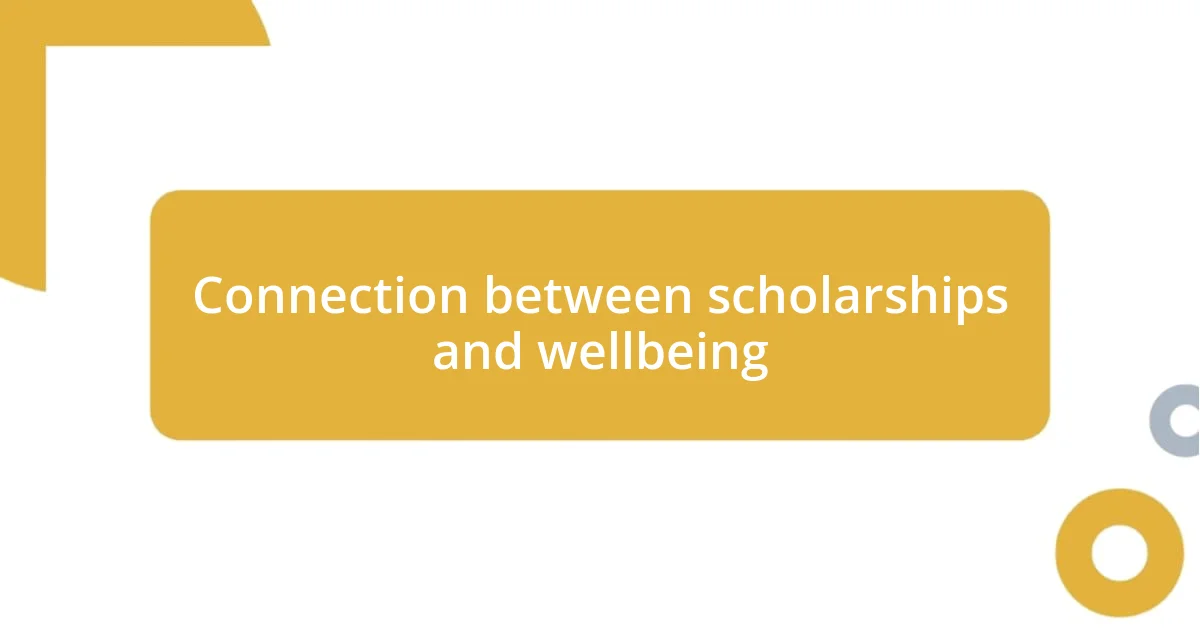
Connection between scholarships and wellbeing
The connection between scholarships and well-being is undeniably complex. Consider this: receiving a scholarship can often feel like a validation of hard work and potential. I remember the moment I was awarded mine; it was as if someone had lifted a veil of uncertainty. Yet, that moment of joy carries with it an implicit pressure to perform, leaving me wondering how to balance that expectation with my everyday mental health.
Financial relief is a significant contributor to improved well-being, but it’s important to acknowledge the flip side. When I met fellow scholarship recipients, conversations about grades often masked underlying feelings of anxiety. It’s as though we were all playing a game where the stakes were our futures. How many times have you felt that pressure to excel beyond your capabilities? It can nurture not only ambition but also a relentless pursuit of perfection, which isn’t always healthy.
Moreover, the emotional toll can be profound. I witnessed a close friend push through anxiety and fatigue to maintain a scholarship, believing that dropping below a certain GPA would result in losing their support. I often wondered if they realized that taking a break could have been a lifeline rather than a setback. Do we really need to gamble our mental well-being for the sake of performance? This constant struggle for balance—between scholarship demands and self-care—leaves many of us walking a tightrope, seeking support while trying to hold it together.
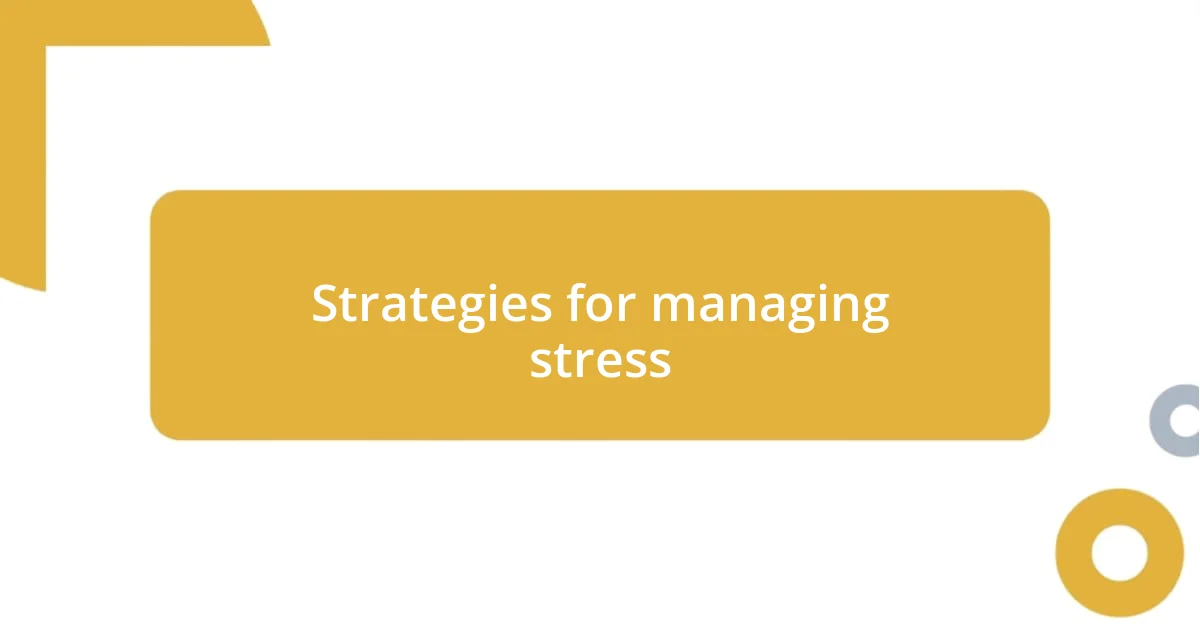
Strategies for managing stress
Finding effective strategies for managing stress is vital for sustaining both mental health and academic success. One of the best approaches I’ve leaned on is adopting a regular mindfulness practice. Whether it’s short meditation sessions or conscious breathing exercises, taking even five minutes to center myself has worked wonders for my anxiety. It’s incredible how just pausing to acknowledge my emotions can create a sense of clarity in the chaos.
Additionally, I’ve discovered that physical activity is a fantastic stress reliever. When I was overwhelmed during exam season, dedicating time for a walk or a workout helped recalibrate my mind. The release of endorphins made a tangible difference in my mood. Have you ever noticed how a little movement can shift your perspective? It’s almost like stepping outside for fresh air can help clear away the fog of stress, allowing for a more productive mindset when I return to my studies.
Lastly, building a support network has been crucial for staying grounded. I remember forming a study group, which turned out to be more than just an academic resource. We shared our struggles and successes, laughing over coffee breaks while supporting each other through tough times. It’s amazing how connection can alleviate feelings of isolation. As I reflect on those moments, I can’t help but think: how often do we underestimate the power of community in managing stress?
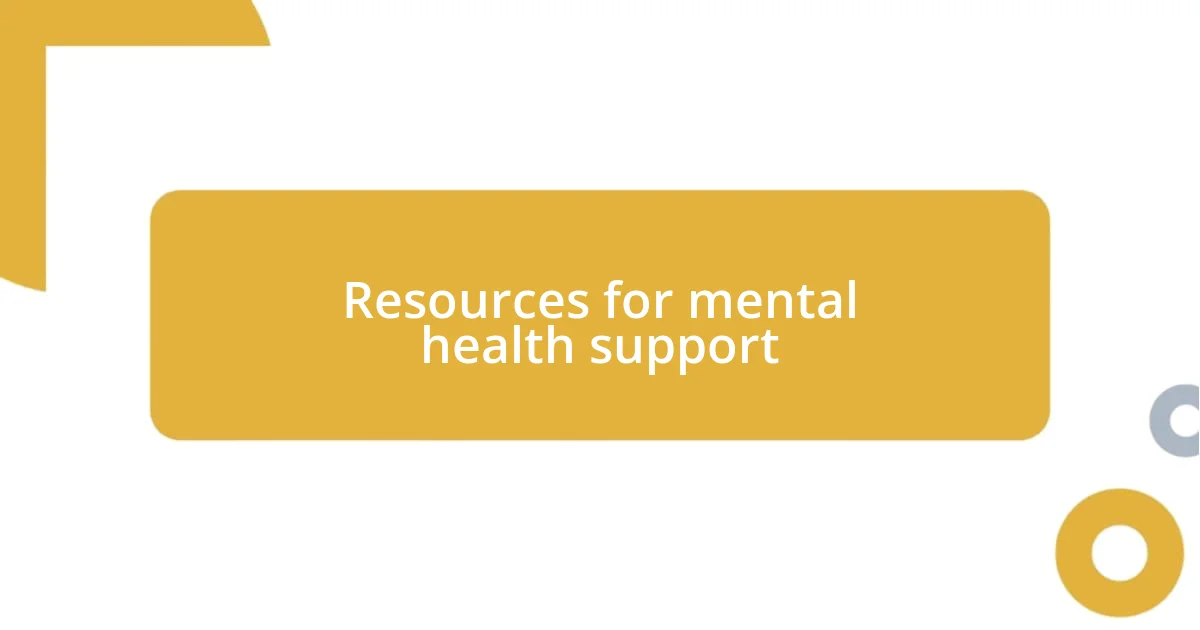
Resources for mental health support
When it comes to mental health support, there are numerous resources available that can help students navigate their feelings and stressors. I vividly recall the day I discovered my university’s counseling service. I was hesitant at first, believing I should simply “tough it out,” but stepping through those doors marked a turning point for me. Have you ever felt that initial resistance to seeking help? It’s a common hurdle, but once I built the courage to talk through my thoughts, I realized how valuable it was to have a safe space to express myself.
Additionally, online mental health platforms have become increasingly popular. I stumbled upon a mental health app that offered daily mood tracking and guided meditations. At first, it felt like just another app on my phone, but I was amazed at how logging my emotions created a calming routine. It made me wonder: could technology be the ally we didn’t know we needed? These tools can empower students to take charge of their mental wellness in a way that feels manageable and tailored to their needs.
Let’s not forget about community resources, like local support groups. I once attended a meetup for students struggling with similar pressures and expectations. Walking into that room full of relatable faces was strangely comforting. In sharing our experiences, I discovered new coping strategies, bolstering my own mental health. Isn’t it reassuring to know we’re not alone in our struggles? These shared moments of vulnerability genuinely foster connections that can provide ongoing support outside of academic life.
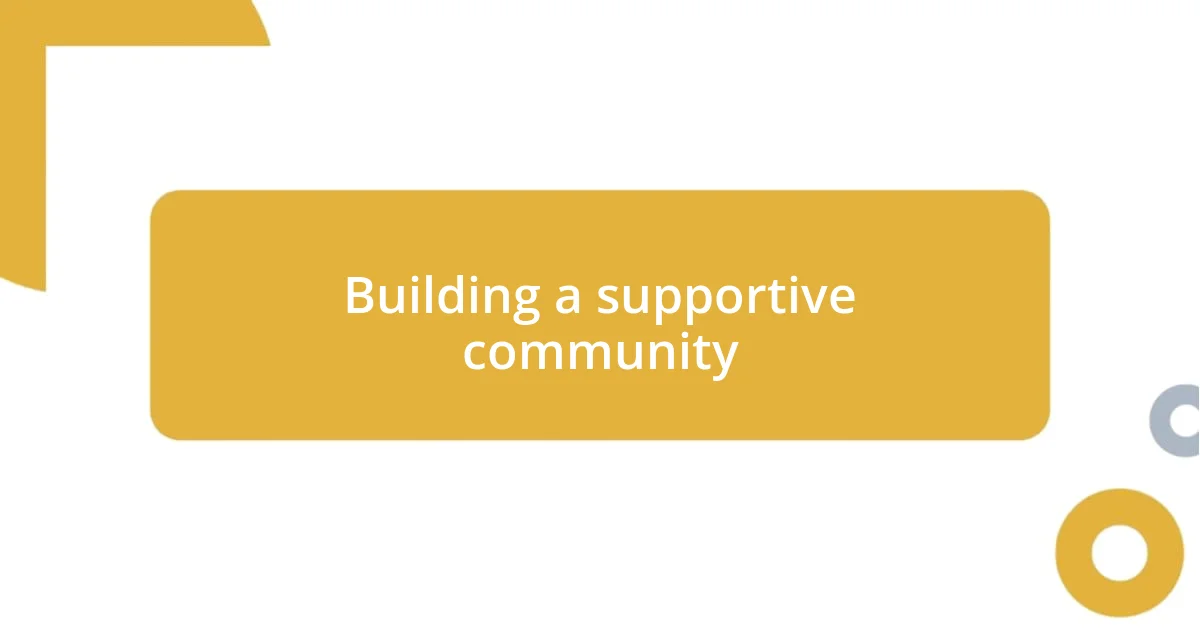
Building a supportive community
Creating a supportive community is vital. I’ve found that connecting with others who share similar challenges can be incredibly uplifting. I remember a time when I felt isolated in my scholarship stress; joining an online forum for students in the same boat made all the difference. The validation I felt from shared experiences was profound—how often do we realize that many of our worries are universal?
One weekend, I organized a small gathering with friends and classmates where we could openly discuss our pressures. As we sat together, the atmosphere shifted from tense to comforting. We shared everything, from anxiety about deadlines to moments of triumph. Did you know that simply sharing your load can lighten it? I left that night feeling not just supported but inspired, fueled by the realization that our collective experiences could empower us all.
Moreover, I believe that building a community goes beyond just sharing struggles; it means celebrating each other’s achievements too. I can’t forget when a friend of mine received a scholarship. Instead of feeling envious, we all rallied around her, sharing in her joy and boosting her confidence. Isn’t it fascinating how uplifting each other can strengthen bonds? I think that might be one of the most rewarding aspects of a supportive community—it enriches our lives as we all grow together.













